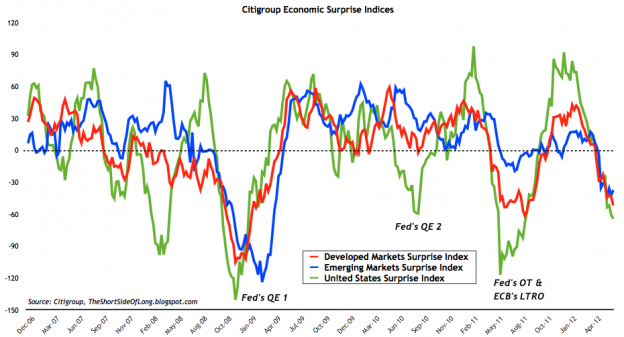The last time we posted the Citigroup Economic Surprise Index the market was starting to reverse off new highs as the index was taking a nosedive. It proved a pretty reliable leading indicator. I like this index because of its uniqueness. It’s an intuitive index in that it compares current sentiment to expectations. That is, it compares actual economic data to the analyst’s expectations. So when the analysts finally reverse course and start to downgrade the outlook the index generally leads their views.
The latest readings here show a large reversal from the highs. Analysts are finally starting to follow the data lower so there’s a sort of self equilibrating factor at work in this index. But the following comments bring up an equally interesting point as this index moves lower. Over the last few years the deep moves lower have tended to coincide with policy actions. If there’s one thing we know from recent years it’s that the market is like a crying baby who needs that pacifier in its mouth every time anything starts to go remotely wrong. And central banks have always been there to give it to them. The market obviously let out a wailing scream last week after Ben Bernanke failed to follow-thru with the big QE3 pacifier. But if this index is any indication of what’s to come we are likely on the verge of increasingly aggressive policy talk and action (Via Short Side of Long & Abnormal Returns):
“Economic data has been weakening meaningfully relative to economist’s expectations in every major global region, according to the Citigroup Economic Surprise Indices. Previous instances where economic data disappointed on similar scale, have led to central bank intervention and it is definitely possible we might see that occur again prior to both the US and German elections. Having said that, previous “money printing programs” have only helped the private sector business activity modestly at best, while we have not been able to reached escaped velocity within the current business expansion. In other words, the expansion has failed to become self sustaining. Therefore, ever summer economy weakens, global investors start asking if we are edging closer to another recession?”
Mr. Roche is the Founder and Chief Investment Officer of Discipline Funds.Discipline Funds is a low fee financial advisory firm with a focus on helping people be more disciplined with their finances.
He is also the author of Pragmatic Capitalism: What Every Investor Needs to Understand About Money and Finance, Understanding the Modern Monetary System and Understanding Modern Portfolio Construction.



Comments are closed.